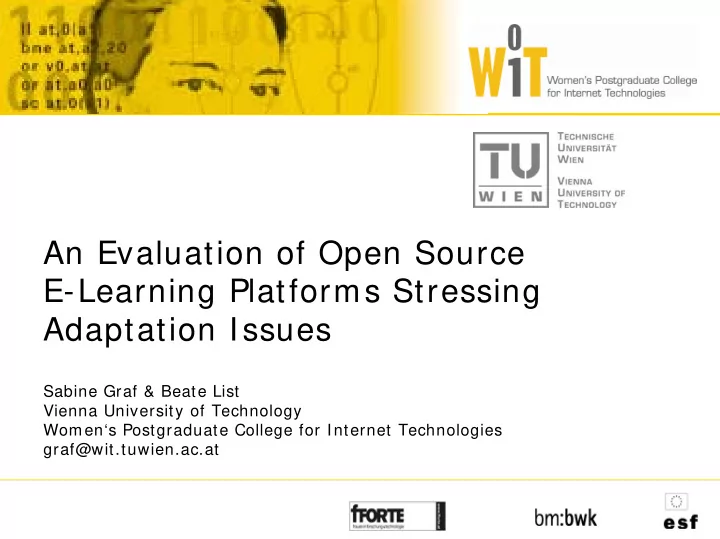

An Evaluation of Open Source E-Learning Platforms Stressing Adaptation Issues Sabine Graf & Beate List Vienna University of Technology Women‘s Postgraduate College for Internet Technologies graf@wit.tuwien.ac.at
Motivation and Aims � E-Learning platforms become very successful � Adaptivity become more and more important � How much adaptivity is supported in today‘s e- learning platforms? � Which platform is most suitable for extending it to an adaptive one? � General functionalities and capabilities � Adaptation issues 2
Evaluation Approach � Applying four minimum criteria to 36 platforms � Installing and testing the remaining 9 platforms � Applying the Qualitative Weight and Sum Approach � Weight: using symbols (e.g., * , # , + , | , 0) � Performance: weight represents the maximum performance value (e.g., + implies + , | , 0) � Result: summarizing all performance values per symbol (e.g., Platform A: 3* , 4# , 2+ Platform B: 4* , 3# , 2+ Platform C: 4* , 2# , 3+ ) � One very good criterion and one very poor criterion are not equal to two moderate criteria � Ranking: Maybe further analysis is necessary 3
Categories, Subcategories & Attributes Adaptation: Adaptation: 8 Categories: 8 Categories: � � Adaptability (* ) Adaptability (* ) Communication tools Communication tools � � � � Personalization (# ) Personalization (# ) Learning objects Learning objects � � � � Extensibility (* ) Extensibility (* ) � � Management of user data Management of user data Adaptivity (* ) Adaptivity (* ) � � � � Usability Usability � � Adaptation Adaptation � � Technical aspects Technical aspects Adaptivity (* ): � � Administration Administration � Annotations of learning objects � � Course management Course management � Annotations of communication objects Static adaptation of course content � � Dynamic adaptation of course content * : Annotations and dynamic adaptation # : Dynamic adaptation + : Two attributes available | : One attribute available 0: No attribute available 4
Results of the Adaptation Category Personalization Legend: * … very good Extensibility Adaptability Adaptivity # … good Ranking + … moderate | …. poor 0 … very poor / not available Maximum values * # * * ATutor | # # | 3 Dokeos | 0 * + 2 dotLRN + + * 0 2 ILIAS + # * 0 2 LON-CAPA + # # | 2 Moodle # + * | 1 OpenUSS # # # 0 2 Sakai 0 0 * 0 3 Spaghettilearning + # + 0 3 5
Results of the Evaluation 2 2 Legend: 3 4 4 6 6 2 7 very good (*) 30 8 1 6 5 4 good (#) 3 3 3 moderate (+) 25 11 10 5 poor (|) 7 5 9 9 not available / very poor (0) 20 10 10 7 11 7 15 10 6 13 9 7 7 10 13 12 8 11 5 9 8 8 7 6 2 0 S r g N e s A S i o a l n A o P S R d t k i e u I n o U a A L L T k r o S t C n I o a A o M e D - e d N l p i t O O t e L h g a p S 6
Conclusion & Ongoing Work � Evaluation of open-source e-learning platforms � Using the Qualitative Weight & Sum Approach � Moodle obtained best values � Adaptivity is included very rarely but extensibility is supported well � Ongoing Work � Meta model for adaptive courses � Extend Moodle with adaptive features as proof of concept prototype 7
Recommend
More recommend